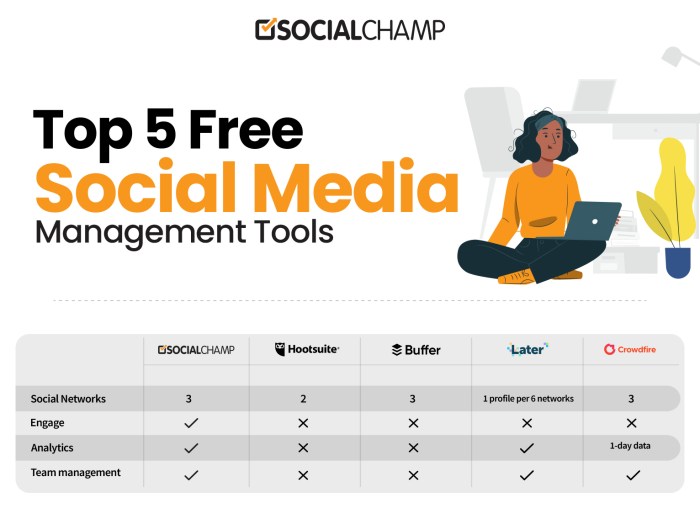Social Media Management Tools sets the stage for this enthralling narrative, offering readers a glimpse into a story that is rich in detail with american high school hip style and brimming with originality from the outset.
From defining the essence of social media management tools to exploring key features and best practices, this guide dives deep into the world of enhancing your online presence through strategic tool utilization.
Overview of Social Media Management Tools
Social media management tools are platforms or software designed to help businesses and individuals manage their social media accounts more effectively. These tools offer a wide range of features to streamline the process of creating, scheduling, analyzing, and engaging with content on various social media platforms.
Common Features in Social Media Management Tools
- Content Scheduling: Allows users to plan and schedule posts in advance, ensuring a consistent presence on social media.
- Analytics and Reporting: Provides insights into the performance of social media campaigns, helping users track metrics and adjust strategies accordingly.
- Content Curation: Helps users discover and share relevant content from various sources to keep their audience engaged.
- Social Listening: Monitors mentions and conversations about a brand or industry on social media, enabling timely responses and engagement.
- Team Collaboration: Facilitates teamwork by allowing multiple users to access and manage social media accounts collaboratively.
Importance of Using Social Media Management Tools for Businesses
Social media management tools play a crucial role in helping businesses streamline their social media efforts, increase efficiency, and achieve better results. By utilizing these tools, businesses can save time, maintain a consistent brand presence, track performance metrics, engage with their audience effectively, and ultimately drive growth and success in their social media marketing strategies.
Types of Social Media Management Tools
When it comes to social media management tools, there are a variety of options available to help businesses and individuals streamline their online presence. These tools can be categorized based on their functionalities, including scheduling posts, analyzing performance, and monitoring interactions.
Scheduling Tools
Scheduling tools allow users to plan and post content across multiple social media platforms at optimal times for maximum engagement. Popular examples of scheduling tools include Hootsuite, Buffer, and Sprout Social. These tools offer features such as content calendars, post queuing, and automated posting.
Analytics Tools
Analytics tools provide insights into the performance of social media content, including reach, engagement, and conversion metrics. Some well-known analytics tools are Sprout Social, Google Analytics, and Socialbakers. These tools help users track key performance indicators (KPIs) and optimize their social media strategies based on data-driven decisions.
Monitoring Tools
Monitoring tools enable users to keep track of brand mentions, comments, and conversations happening across social media platforms. Examples of monitoring tools include Mention, Brandwatch, and Talkwalker. These tools help businesses stay informed about their online reputation and respond promptly to customer inquiries or feedback.
Free vs. Paid Tools
While many social media management tools offer free versions with basic features, paid tools typically provide more advanced functionalities and comprehensive support. Free tools like Buffer and Hootsuite offer limited scheduling capabilities and analytics insights, while paid tools like Sprout Social and Socialbakers provide robust features for larger businesses with higher social media management needs.
Key Features to Look for in Social Media Management Tools

When choosing a social media management tool, it’s essential to look for key features that can help streamline your social media efforts, improve engagement, and track performance effectively. Here are some important features to consider:
Scheduling Posts
Scheduling posts in advance allows you to plan your content calendar, maintain a consistent posting schedule, and reach your audience at optimal times. This feature helps save time and ensures your content is delivered when your audience is most active.
Analytics, Social Media Management Tools
Analytics provide valuable insights into the performance of your social media campaigns. Tracking metrics such as engagement, reach, and conversions can help you understand what content resonates with your audience and make data-driven decisions to improve your strategy.
Social Listening
Social listening tools allow you to monitor conversations about your brand, industry trends, and competitors. By staying informed about what people are saying, you can engage with your audience, address customer concerns, and identify opportunities for growth.
Content Calendar
A content calendar feature helps you plan and organize your social media content effectively. It allows you to visualize your posting schedule, collaborate with team members, and ensure a consistent brand voice across all platforms.
Integration with Multiple Platforms
Look for a tool that supports integration with various social media platforms to manage all your accounts in one place. This feature simplifies workflow, saves time, and ensures a cohesive strategy across different channels.
Customizable Reporting
Customizable reporting features enable you to create detailed reports tailored to your specific goals and KPIs. By tracking performance metrics and generating comprehensive reports, you can demonstrate the impact of your social media efforts and make informed decisions for future campaigns.
Best Practices for Using Social Media Management Tools

In order to maximize the effectiveness of social media management tools, it is essential to implement certain best practices. These strategies can help streamline your social media efforts, increase engagement, and analyze performance more effectively.
Creating an Effective Social Media Content Calendar
Creating a social media content calendar is crucial for maintaining consistency and organization in your posting schedule. Here are some tips for creating an effective content calendar using social media management tools:
- Use a tool that allows you to schedule posts in advance, such as Hootsuite or Buffer.
- Plan your content themes and topics in advance to ensure a cohesive and strategic approach.
- Include a variety of content types, such as images, videos, links, and text posts, to keep your audience engaged.
- Set specific posting times based on when your target audience is most active on each platform.
- Regularly review and update your content calendar to reflect current trends and events.
Monitoring and Analyzing Social Media Performance
Monitoring and analyzing social media performance is key to understanding what is working well and where there is room for improvement. Here are some insights on how to effectively monitor and analyze social media performance using social media management tools:
- Track key performance indicators (KPIs) such as engagement rates, click-through rates, and follower growth to measure success.
- Use analytics tools provided by social media management platforms to gain insights into audience demographics, behavior, and preferences.
- Monitor mentions, comments, and direct messages to respond promptly and engage with your audience effectively.
- Regularly review performance reports to identify trends and patterns that can inform your social media strategy.
- Experiment with different types of content and posting strategies to optimize performance over time.





